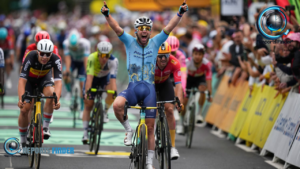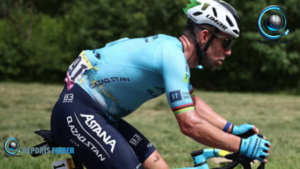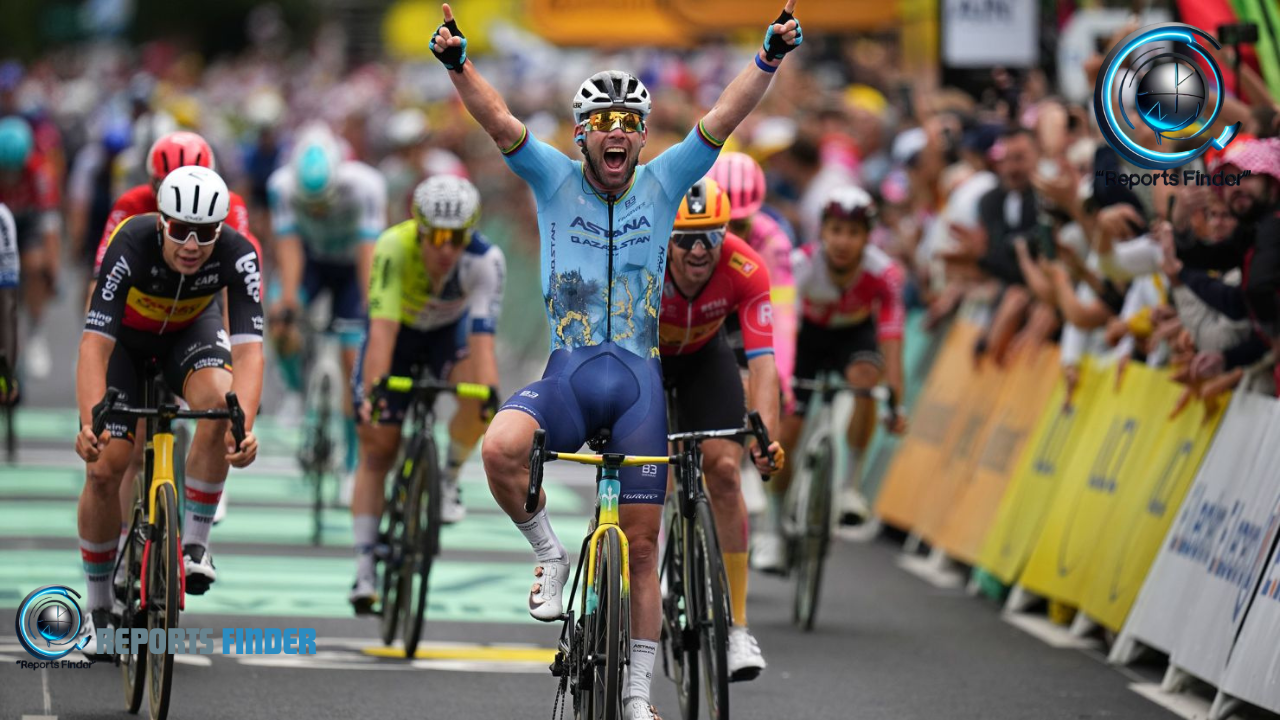Introduction
Mark Cavendish: The Manx Missile of Professional Cycling .Mark Cavendish, affectionately known as the “Manx Missile,” is one of the most successful and influential sprinters in professional cycling history. With a career marked by explosive speed, tactical prowess, and an indomitable spirit, Cavendish has left an indelible mark on the sport. His numerous victories, particularly in the Tour de France, have cemented his status as a cycling legend.
Early Life and Career Beginnings

Born on May 21, 1985, in Douglas, Isle of Man, Mark Cavendish developed a passion for cycling at an early age. Inspired by the cycling culture of his homeland and supported by a family that encouraged his sporting ambitions, Cavendish quickly showed promise on the bike.
As a teenager, he joined the Manx Road Club and began competing in local races. His talent was evident, and he soon progressed to the British Cycling Academy, where he honed his skills and received mentorship from experienced coaches. This early foundation laid the groundwork for his future success in the professional ranks.
Rise to Prominence
Cavendish’s rise to prominence began with impressive performances in junior and amateur races. His breakthrough came in 2005 when he won the Madison World Championship with Rob Hayles. This victory brought him to the attention of professional teams, and in 2006, he signed with T-Mobile, marking the start of his professional career.
His early years in professional cycling were marked by rapid success. Cavendish’s first major win came in the 2007 Tour of Catalonia, where he showcased his sprinting prowess. This victory was followed by a series of wins in the Tour of Britain and other prominent races, establishing him as a formidable sprinter.
Tour de France Success
The Tour de France has been the stage where Cavendish truly shined. His first Tour de France stage win came in 2008, and he quickly became known for his ability to dominate the sprints. Over the years, he accumulated an impressive number of stage victories, each one demonstrating his incredible speed and tactical acumen.
Cavendish’s memorable wins include multiple stage victories in the 2009, 2010, and 2011 editions of the Tour de France. His performance in the 2011 Tour, where he won five stages and the coveted green jersey for the points classification, solidified his reputation as one of the greatest sprinters of all time.
Other Grand Tour Performances
While the Tour de France is where Cavendish gained much of his fame, he also found success in other Grand Tours. In the Giro d’Italia, he has won several stages and the points classification, demonstrating his versatility and consistency.
In the Vuelta a España, Cavendish has also secured stage wins, further showcasing his ability to perform across different races and conditions. His performances in these Grand Tours highlight his skill, endurance, and determination.
World Championships and Major Wins
Cavendish’s career is adorned with victories beyond the Grand Tours. One of his most significant achievements came in 2011 when he won the UCI Road World Championships in Copenhagen. This victory earned him the prestigious rainbow jersey and cemented his status as a world-class cyclist.
In addition to his World Championship win, Cavendish has claimed victories in classic races, such as Milan-San Remo in 2009. His ability to excel in various race formats underscores his exceptional talent and versatility.
Riding Style and Strengths

Mark Cavendish is renowned for his explosive sprinting abilities. His riding style is characterized by a powerful acceleration, tactical positioning, and a keen sense of timing. Cavendish’s sprints are marked by his ability to find the perfect line and outpace his rivals in the final meters of a race.
His unique characteristics, such as his low aerodynamic profile and compact build, give him an edge in high-speed sprints. Cavendish’s success is also attributed to his mental toughness and competitive spirit, which drive him to perform at his best in the most challenging situations.
Challenges and Setbacks
Despite his many successes, Cavendish’s career has not been without challenges. He has faced numerous injuries, including a significant shoulder injury sustained in a crash during the 2014 Tour de France. These injuries have required extensive recovery periods and have tested his resilience.Mark Cavendish: The Manx Missile of Professional Cycling
In addition to physical setbacks, Cavendish has also dealt with the psychological toll of high-level competition. The pressure to perform, coupled with the demands of maintaining peak physical condition, has posed significant challenges throughout his career.Mark Cavendish: The Manx Missile of Professional Cycling
Comeback Stories
Cavendish’s career is marked by remarkable comebacks. After injuries and periods of poor form, he has repeatedly demonstrated his ability to return to the top of his game. One notable comeback was in 2016 when he won four stages of the Tour de France, defying critics who doubted his ability to return to his best.Mark Cavendish: The Manx Missile of Professional Cycling
These comebacks are a testament to Cavendish’s determination, work ethic, and unwavering belief in his abilities. His resilience serves as an inspiration to aspiring cyclists and sports enthusiasts alike.Mark Cavendish: The Manx Missile of Professional Cycling
Team Dynamics and Partnerships
Throughout his career, Cavendish has ridden for several prominent teams, including T-Mobile, HTC-Highroad, Team Sky, and Deceuninck-Quick-Step. The support of his teammates, particularly those in the lead-out train, has been crucial to his success.Mark Cavendish: The Manx Missile of Professional Cycling
Strong partnerships with lead-out riders, who position him for the final sprint, have played a significant role in Cavendish’s victories. The trust and coordination within the team are essential elements of his sprinting strategy.Mark Cavendish: The Manx Missile of Professional Cycling
Personal Life and Interests
Off the bike, Mark Cavendish is known for his family-oriented nature and diverse interests. He is married to model Peta Todd, and together they have children. Family is a central part of Cavendish’s life, providing him with support and motivation.Mark Cavendish: The Manx Missile of Professional Cycling
Cavendish has also engaged in various philanthropic activities, supporting causes such as the fight against motor neurone disease and promoting youth cycling programs. His contributions to charitable initiatives reflect his commitment to giving back to the community.Mark Cavendish: The Manx Missile of Professional Cycling
Legacy and Influence
Mark Cavendish’s impact on the world of cycling extends beyond his race victories. He has inspired a new generation of cyclists and has contributed to the growth and popularity of the sport. His achievements have earned him numerous accolades and awards, including being appointed a Member of the Order of the British Empire (MBE) for his services to cycling.
Cavendish’s legacy is characterized by his relentless pursuit of excellence, his sportsmanship, and his role as an ambassador for cycling. His influence will continue to be felt long after he retires from professional competition.
Current Status and Future Prospects
As of now, Mark Cavendish remains an active competitor in professional cycling, although his future plans are a topic of much speculation. Whether he chooses to continue racing or transition to a different role within the cycling community, his experience and insights will undoubtedly benefit the sport.
Cavendish has expressed interest in coaching and mentoring young cyclists, a role in which he can share his knowledge and passion for cycling. His future contributions, whether on or off the bike, will continue to shape the sport he loves.
Fans and Public Perception
Mark Cavendish enjoys widespread popularity among fans and media alike. His charismatic personality, coupled with his achievements, has earned him a loyal following. Cavendish is known for his engaging interactions with supporters and his genuine appreciation for their support.
Despite facing criticism at times, particularly during periods of poor performance, Cavendish has maintained a positive public image. His resilience, honesty, and dedication to the sport have endeared him to fans worldwide.
Technological and Training Innovations
Cavendish has embraced technological advancements and innovative training methods throughout his career. From using cutting-edge bikes and equipment to adopting new training techniques, he has continually sought ways to enhance his performance.
His openness to innovation has influenced modern cycling practices, encouraging other athletes to incorporate technology and science into their training regimens. Cavendish’s commitment to improvement and adaptation underscores his status as a forward-thinking athlete.
Conclusion
Mark Cavendish’s career is a testament to the power of determination, talent, and resilience. His contributions to cycling, both in terms of race victories and his influence on the sport, are unparalleled. Cavendish’s legacy will continue to inspire and shape the world of professional cycling for years to come.
FAQs
1. How many Tour de France stage wins does Mark Cavendish have?
Mark Cavendish has won 34 Tour de France stage victories, tying him with the legendary Eddy Merckx for the most stage wins in the race’s history.
2. What makes Mark Cavendish a great sprinter?
Cavendish’s explosive acceleration, tactical positioning, and mental toughness make him a great sprinter. His ability to outpace rivals in high-speed finishes has earned him numerous victories.
3. How has Mark Cavendish impacted the sport of cycling?
Cavendish has inspired a new generation of cyclists and contributed to the popularity of sprinting in professional cycling. His achievements and sportsmanship have left a lasting legacy in the sport.
4. What challenges has Cavendish faced in his career?
Cavendish has faced numerous challenges, including injuries, crashes, and the psychological demands of high-level competition. His resilience in overcoming these obstacles is a key part of his story.
5. What are Cavendish’s plans for the future?
While still an active competitor, Cavendish has expressed interest in coaching and mentoring young cyclists. His future contributions to cycling will likely include roles that allow him to share his knowledge and passion for the sport.
